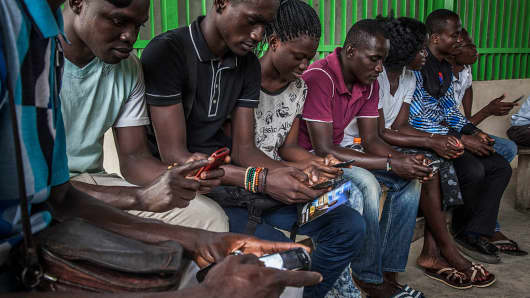Technology has transcended poverty, race and economic conditions to become a driving force in the lives of people across the world. More people around the world now have access to the internet and mobile phones. As technology increases, the socioeconomic effects will improve the lives of impoverished people in Africa (Develop Africa, 2016). More African children are growing up in a world where social media and online communities are essential to the way they learn and develop (2016). Technology is helping to transform developing countries and is closing the gap between the rich and the poor (2016).
The wireless age is transcending the obstacles of this great continent. New technologies bypass poor roads, unreliable energy, and political instability (Moran, Abramson & Moran, 2014). Africans are using this technology for more than just talking and texting. It has provided powerful developmental tools that help to educate farmers on new farming technologies that will help them yield more production. Farmers are using aerial images from drones, weather forecasts and soil sensors to manage crop growth in real time (Ekekwe, 2017). Technology has also provided powerful tools to develop education and learning among children and teachers. Teachers have easier access to educational tools that they can use in the classroom as well as educational tools to help develop themselves.
The most popular technology tool in Africa is the mobile device. Mobile phone use in Africa is outpacing that of South Africa, making Africa the second largest mobile phone market in the world behind Asia (Fogarty, 2012). While technology appears to be transcending in Africa, there are still significant issues with the use of technology (Fogarty, 2012). These include limited electricity. True economic transformation will only happen once the continent solves its power issues. In addition to power issues, Africa is primarily rural population and political turmoil exists in much of the continent.

Jose Cendon | Bloomberg | Getty Images
Despite these concerns and the fact that Africa is not the richest country, African optimism prevails. Africans remain the world’s staunchest optimists (Moran, Abramson & Moran, 2014). A world survey by Gallup International found that sixty percent of the African respondents think that the present year will be better than the last (2014). Development should not be surprising, despite the many political and socioeconomic struggles hindering Africa’s overall progress. “On this planet only one continent is growing faster than all the others in population, and it’s likely to keep growing even faster,” says Steve Mutabazi, a chief strategist with the Rwanda Development Board. “When you have a developing region with enough members developing an ecosystem, it generates incredible momentum for investment in that region.” He adds, “Africa, is at that point now” (Draper, n.d.).
“Africa is a land of great promise and potential, a continent of immense natural beauty and resources, most of which is still undeveloped” (Moran, Abramson & Moran, 2014, p. 503). Africa has been known as the dark continent (2014) as not much has been known about the continent. Interestingly, the ‘Dark Continent’ is the richest continent on earth in terms of natural and human resources. Africa appears to be catching up to the rest of the world.
Resources
Develop Africa. (2016). Technology’s impact on the African poor. Retrieved from https://www.developafrica.org/blog/technology%E2%80%99s-impact-african-poor.
Draper, R. (n.d.). How Africa’s tech generation is changing the continent. National Geographic. Retrieved from https://www.nationalgeographic.com/magazine/2017/12/africa-technology-revolution/.
Ekekwe, N. (2017). How digital technology is changing. Harvard Business Review. Retrieved from https://hbr.org/2017/05/how-digital-technology-is-changing-farming-in-africa.
Fogarty, M. (2012). Africa: Technology in education. Education, 93(4), 14. Retrieved from http://ezaccess.libraries.psu.edu/login?url=https://search-proquest-com.ezaccess.libraries.psu.edu/docview/1018075470?accountid=13158
Moran, R. T., Abramson, N. R., & Moran, S. V. (2014). Managing Cultural Differences (Ninth ed.). New York: Routledge.

Leave a Reply
You must be logged in to post a comment.